Park Chan-wook is a Korean decadent and moralist who’d have plenty to say to Aubrey Beardsley.

Julian Barnes’s 2011 novel The Sense of an Ending teased the brains of many a reader with its split time frame and ambiguous conclusion. It was the sort of thing that the interiorised world of fiction can do surpassingly well, and Barnes had handled it skilfully enough to carry off the Man Booker Prize.

There have been plenty of films glamourising diamond geezers who live on the wrong side of the law. Some of them don’t even star Danny Dyer. In the history of British film, rhyming slang plus dodgy morals equals box office. Perhaps there is even a special source of European funding ring-fenced for low-budget films about cockney gangsters. The true story of the old lags who pulled off the biggest heist in burgling history was always destined to be dramatised. Someone probably tried to option it as soon as the news broke. The result is The Hatton Garden Job, directed by Ronnie Thompson.
A quick story recap. Two years ago four men broke into the underground vault of the Hatton Garden Safe Deposit Company and made off with diamonds and cash to the value of an estimated £14 million, possibly much more. It wasn’t just the scale of the job. It was also the fact that three of the robbers, who were caught within a month, were pensioners. Only one of them got away, a mysterious figure known only as “Basil” who has never been located let alone charged.
It’s from his fictionalised point of view that the narrative unfolds with generous dollops of knowing voiceover. Played by Matthew Goode with his usual blue-eyed swagger, he emerges from three years in prison fired up by a desire to pull off the big one, and sets about assembling his accomplices, who after statutory reluctance sign up. “Mental?” crows one. “It’s monumental.” In charge is a wheezing old con with a weak bladder called Brian Reader (Larry Lamb). Terry Perkins (David Calder), Danny Jones (Phil Daniels) and sozzled driver Kenny Collins (Clive Russell) make up the party. They set about planning - we are spared the months of meticulous gruntwork it actually required - and in due course alight on the Easter weekend to ill-get their gains. They call the quarry “tom”. “Tomfoolery, jewellery,” explains Goode. “The old timers love their word games.” At least someone does.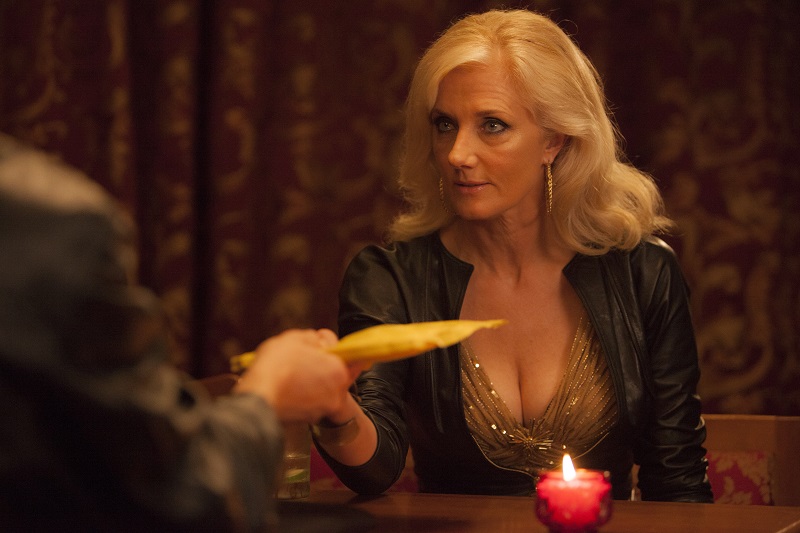 Thompson has managed to lure a cast who can relied upon to say the lines and not bump into the furniture, but his script somehow contrives to stumble into every British gangster cliché while syringing the last ounce of life out of every scene. The actors telecommunicate their own overpowering boredom through the lens. They break in to the accompaniment of an amazingly stillborn piece of noodly music on the soundtrack. When they start boring a hole through the wall of the safe deposit chamber, it can be taken as a visual metaphor. It takes almost literally forever. Even the sequence in which they amass their stash of cash and stones is extraordinarily dull. The prize for the most lurid performance goes to Joely Richardson (pictured above) as a Hungarian drug baroness with a cartoon Slavic accent who speaks even more slowly than everyone else. But she can be excused: the script gives her no room for manoeuvre.
Thompson has managed to lure a cast who can relied upon to say the lines and not bump into the furniture, but his script somehow contrives to stumble into every British gangster cliché while syringing the last ounce of life out of every scene. The actors telecommunicate their own overpowering boredom through the lens. They break in to the accompaniment of an amazingly stillborn piece of noodly music on the soundtrack. When they start boring a hole through the wall of the safe deposit chamber, it can be taken as a visual metaphor. It takes almost literally forever. Even the sequence in which they amass their stash of cash and stones is extraordinarily dull. The prize for the most lurid performance goes to Joely Richardson (pictured above) as a Hungarian drug baroness with a cartoon Slavic accent who speaks even more slowly than everyone else. But she can be excused: the script gives her no room for manoeuvre.
It’s not quite a shame. There’s nothing redemptive in the story of some comedy codgers who were crafty enough to pull off the job but not enough to know how to fence their takings or evade capture. Collins even drove back to the scene of the crime in his own car, the plonker. Often in bank raid movies you find yourself rooting for the miscreants. Not here. On his voiceover Goode argues that his kind rob bankers not banks, as if that’s a good thing. From start to finish the whole project is dramatically and ethically bankrupt.
Overleaf: watch the trailer to The Hatton Garden Job

Arnie acts! Like “Garbo laughs,” there are some things you learn never to expect, and a credible, committed Arnold Schwarzenegger playing a grief-stricken construction worker is high among them. His role as a melancholy father dealing with his daughter’s impending transformation into a murderous zombie in Maggie (2015) was the first indication of a new direction.

The Oscar-nominated documentary I Am Not Your Negro is a chronicle of the pioneering writer and Civil Rights activist James Baldwin. Its director Raoul Peck mirrors the intellectual challenge that Baldwin set his audience: the film demands that you pay close attention and listen to a complex argument backed up visually with diverse social and cultural references.

Is there something about the recessive life of Emily Dickinson that defies dramatisation? I'm beginning to think so after A Quiet Passion. The Terence Davies film may attempt a more authentic take on the unrelievedly bleak, and also great, 19th-century American poet than the stage vehicle about her, The Belle of Amherst, now long past its sell-by date. But whether serving a film biography or a solo theatre venture, Dickinson seems somehow to elude aesthetic capture, or maybe it's just that she turns out to be as oblique as the landscape of her most enduring poems.
On the face of it, Dickinson might seem well-matched to Davies, the English writer-director whose penchant for penetrating studies of anguished women (The Deep Blue Sea, Sunset Song) ought to place Cynthia Nixon's performance in a recognisable spectrum, of distant voices and still lives.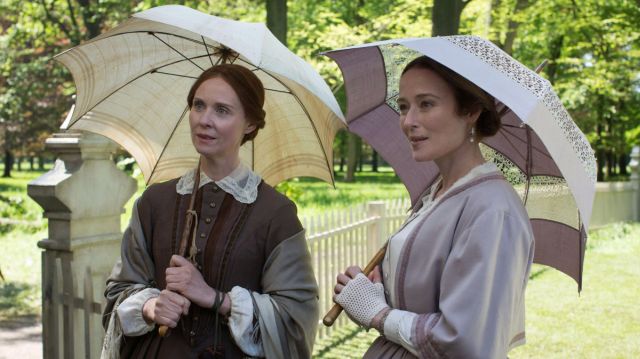 Instead, Davies's screenplay is remarkable mostly for an archness and artifice only partially redeemed by several of the performances. To be sure, Nixon is entirely committed, but Jennifer Ehle is just as captivating as Emily's more spirited younger sister Lavinia. There is a grave beauty to the whole that approximates in visual terms to something of the poetry's eloquent formality. Here's just a taste of Dickinson's unyielding language, taken from the end of one of her most celebrated anatomies of trauma: "As freezing persons, recollect the Snow – / First – Chill – then Stupor – then the letting go – ".
Instead, Davies's screenplay is remarkable mostly for an archness and artifice only partially redeemed by several of the performances. To be sure, Nixon is entirely committed, but Jennifer Ehle is just as captivating as Emily's more spirited younger sister Lavinia. There is a grave beauty to the whole that approximates in visual terms to something of the poetry's eloquent formality. Here's just a taste of Dickinson's unyielding language, taken from the end of one of her most celebrated anatomies of trauma: "As freezing persons, recollect the Snow – / First – Chill – then Stupor – then the letting go – ".
One can imagine the frisson that might have been generated had Dickinson ever been handed over to the likes of Robert Bresson – and a younger Isabelle Huppert might have displayed just the right ascetic severity for the character. As it is, Nixon brings an indrawn intensity to the role of this housebound visionary who is heard at one point commendng poetry as "my solace for the eternity that surrounds us all". Not the sort of person, then, with whom you're likely to nip out for a digestif (or even a Diet Coke). 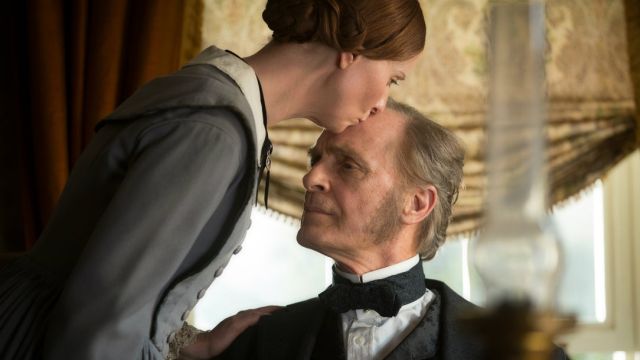 Keith Carradine, The stultifying family dynamics find Nixon's ever-determined scribe attempting to hold her own alongside a feckless and uncomprehending brother (Duncan Duff) and a stern-faced father (pictured above, sporting killer sideburns). Only Lavinia seems to have a handle on her sister as both aesthetician and human being. Such filial warmth as exists cannot prevent Emily's retreat from the world, but not before she is seen clinging to grammatical propriety like some lone survivor of a typographic Titanic.
Keith Carradine, The stultifying family dynamics find Nixon's ever-determined scribe attempting to hold her own alongside a feckless and uncomprehending brother (Duncan Duff) and a stern-faced father (pictured above, sporting killer sideburns). Only Lavinia seems to have a handle on her sister as both aesthetician and human being. Such filial warmth as exists cannot prevent Emily's retreat from the world, but not before she is seen clinging to grammatical propriety like some lone survivor of a typographic Titanic.
First encountered in school-age solitude (and played by Emma Bell) before Nixon assumes the role, this Dickinson is always the brightest person in the room. That's a major reason why you can't help but feel she would have been unimpressed by the faux-Wildean wordplay of her great friend, Vryling Buffam (Catherine Bailey). In the end, one is drawn primarily to the rigorous beauty of the European locations that stand in for 19th-century rural Massachusetts and to the power of Nixon when she can drop having to act Emily as a person in favour of simply living with her language. At such moments, we're gloriously reminded of that quintessentially Dickinsonian carriage that held "not just Ourselves", so the poem tells us, "but Immortality".
Overleaf: watch the trailer for A Quiet Passion

Chilean director Pablo Larrain has described Neruda as a “false biopic”, and it’s a film that surprises on many levels in its presentation of Pablo Neruda, the great poet who is his country’s best-known cultural figure. It captivates for the scope of its invention, its ludic combination of reality and artifice, poetry and politics, as well as the contradictions of its central character.
Larrain's last film Jackie was also a biopic with a difference, but Neruda goes further in every sense. It’s also something of a departure from the director’s earlier works, such as No and Post Mortem, which were grounded in the very real context of Chile in the Pinochet years, or The Club, which showed how the inheritance of that totalitarian world endured after its actual circumstances had ended. Set in 1948, Neruda works as a prologue to that era: it was then that Chilean president Gabriel González Videla, who had come to power with a leftist agenda, realigned his loyalties away from Communism in a “sell-out to the empire of the North”.
This symbiotic relationship works very much in one direction
As well as his renown as a writer, Pablo Neruda was a Senator from the Communist Party, and his denouncement of Videla for this political change of tack made him an immediate enemy of the authorities. We first encounter him in the corridors of power, specifically an anteroom in the Senate that bizarrely seems to function as a combination of common room, urinal and bar (imbibing is plentiful throughout the film). That presents him as statesman, and though the epithet of “the most important communist in the world” may be an exaggeration, the poet’s international reputation, backed by Europe intellectuals including that other great Pablo, Picasso – who makes cameo appearances – gave him real importance in his world.
The next time we meet him is in a very different conext, at an almost bacchanalian party at the poet’s home, clearly a point of congregation for Chile’s own intelligentsia as well as off-duty public figures. The atmosphere is part fancy-dress fiesta – Neruda costumes himself as Lawrence of Arabia – part cultural salon, presided over by the poet and his wife Delia (Mercedes Morán, pictured below), the Argentine aristocrat whose acceptance of her husband’s philandering was only part of the unwavering support that she gave him. The contrast is highlighted when a Party delegation arrives to warn that he must go into hiding. In the portrayal of Luis Gnecco, an actor with a pedigree in comedy, the poet is a corpulent voluptuary, most unlike more typical revolutionary heroes; although he obviously does not "know what it is to sleep on the floor”, his writings and personality nevertheless inspire real devotion among Chileans.
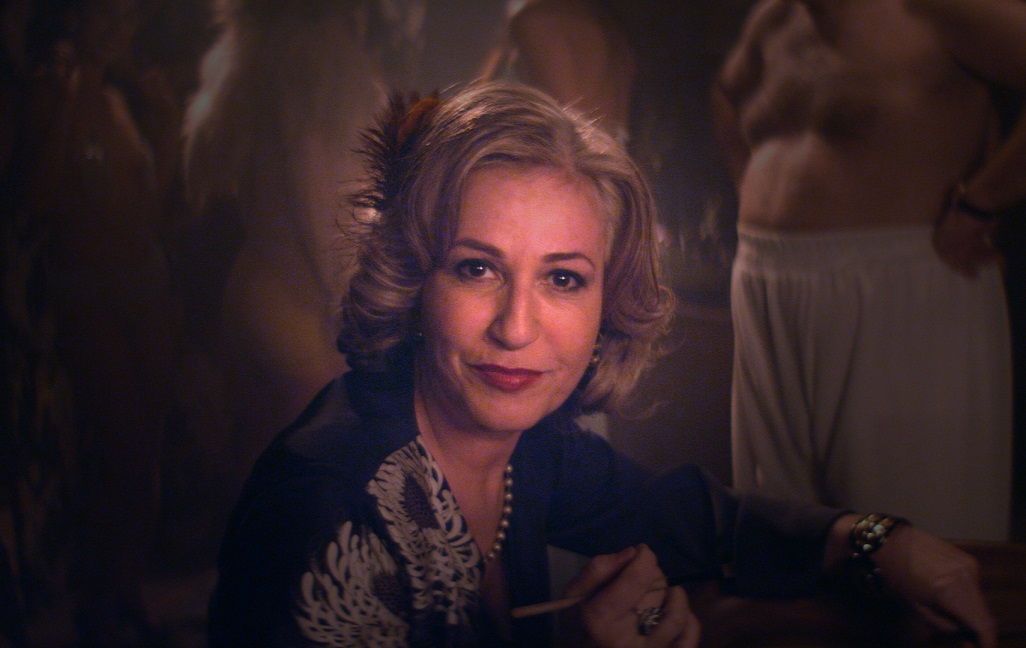 In a nicely satirical scene, Neruda finds that his connections within the old Chilean aristocracy (which still really runs the country) are of no avail, while his attempt to flee abroad is halted at the border. At which point the film's “wild hunt” sets in. With the poet on the run, his pursuer becomes police inspector Oscar Peluchonneau (Gael García Bernal, playing with nicely stylised verve), whom we have already encountered in voiceover. The communists may have initially debated whether the poet might be more valuable as a prisoner – we get a glimpse of what his fate in captivity would have been in a desert detention camp under the command of Augusto Pinochet, the nation’s future dictator – but now Party minders will be hurrying him and Delia from one safe house to another. Such furtiveness is alien to Neruda, who can’t resist reappearing at his old haunts, albeit often in disguise.
In a nicely satirical scene, Neruda finds that his connections within the old Chilean aristocracy (which still really runs the country) are of no avail, while his attempt to flee abroad is halted at the border. At which point the film's “wild hunt” sets in. With the poet on the run, his pursuer becomes police inspector Oscar Peluchonneau (Gael García Bernal, playing with nicely stylised verve), whom we have already encountered in voiceover. The communists may have initially debated whether the poet might be more valuable as a prisoner – we get a glimpse of what his fate in captivity would have been in a desert detention camp under the command of Augusto Pinochet, the nation’s future dictator – but now Party minders will be hurrying him and Delia from one safe house to another. Such furtiveness is alien to Neruda, who can’t resist reappearing at his old haunts, albeit often in disguise.
The trimly moustached Peluchonneau (pictured below) is a creature of fiction in every sense. In his own version he’s the illegitimate son of the founder of the Chilean police force and a prostitute, but actually his identity seems to develop as a product of Neruda's fantasy. The poet certainly seems to be in command of the pursuit, leaving a series of cheap detective stories – one of the writer’s fascinations – behind at each step of the chase (Larrain adds rear projections in Peluchonneau's car scenes, highlighting the detectve tropes). The ultimate indignity he feels is the suspicion that without his target he himself is literally nothing: Neruda may refer to him as “my phantom in uniform”, but it is clear that he is the one writing the script. This symbiotic relationship – “I dream of him, he dreams of me” – works in one direction.
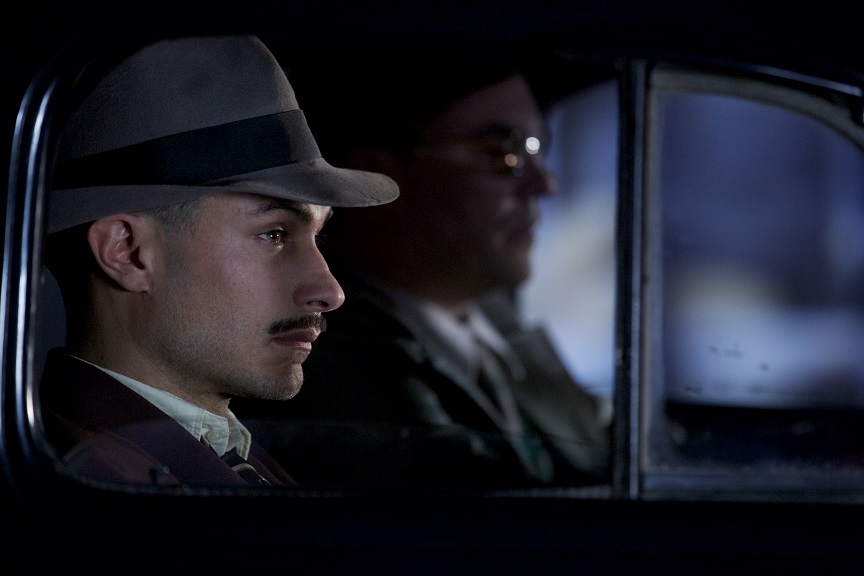 There is rich comedy in the process, as at each stage the hapless Peluchonneau arrives too late, or is defeated by disguises (there's a very funny scene set in a transvestite brothel). His interception of Neruda’s first wife Maria, and attempts to involve her in the process, are brought to a hilariously bathetic conclusion, while his encounter with Delia, no longer following her husband in his escape, provides one of the film's most telling scenes.
There is rich comedy in the process, as at each stage the hapless Peluchonneau arrives too late, or is defeated by disguises (there's a very funny scene set in a transvestite brothel). His interception of Neruda’s first wife Maria, and attempts to involve her in the process, are brought to a hilariously bathetic conclusion, while his encounter with Delia, no longer following her husband in his escape, provides one of the film's most telling scenes.
The pursuit becomes increasingly frantic, culminating in a dramatic ascent into the snows of the Andean mountains. Those last scenes are beautifully filmed by Larraine’s long-term cinematographer Sergio Armstrong, who also catches the darker period cityscapes of Santiago and the bright colours of Neruda’s festivities – both imagined and not, they have a visual flare that Fellini would surely have relished – with distinction. Federico Jusid contributes a grandiose musical score that feels like a presence in its own right.
“I chased the eagle, but I didn’t know how to fly,” Peluchonneau admits poignantly towards the end. We know from history that Neruda will escape, and flourish in emigration: his pursuer faces the cold end of irrelevance. It's a wry conclusion to a wry film, one which in its playful self-referencing sometimes recalls the work of Peter Greenaway. Larrain may not have set out to "catch" his subject in any predictable way, but his film is certainly imbued with the poet's spirit.
Overleaf: watch the trailer for Neruda

The harsh metallic rasp of a cigarette lighter; a glamorous, vulnerable prostitute in distress; a noble lone crime-fighter standing dejected in the rain. All the familiar tropes of noir are present and correct – in fact, almost self-consciously ticked off – in this entertaining thriller from Pete Travis (Dredd, Endgame). But they’re in a jarringly unfamiliar context: this is modern-day, grimy, multi-ethnic west London – located specifically with mentions of Scrubs Lane and Kensal Rise tube station – with its relentless gentrification, luxury housing developments sprouting all around, small-time drug dealing and hints of Islamic radicalism.
Tommy Akhtar (Riz Ahmed) is a small-time private investigator – "I deal in the lies people tell and the truths they don’t," he mutters in one of the film’s sporadic voice-overs. He’s approached by high-class hooker Melody Chase (Cush Jumbo) to investigate the disappearance of her friend and co-worker Natasha, but things take a darker turn when he discovers a dead body in the Paddington Basin Holiday Inn, and he sends his young protégé Avid (Mohammad Ali Amiri) to check out the possible involvement of the dodgy-looking Islamic Youth League.
There’s an awful lot going on, and it sometimes feels like writer Patrick Neate, who adapted the script from his own 2005 novel, has just too many targets in his sights to do them all justice. But, slickly paced by Travis – despite a brief dead patch in the middle – it’s an entertaining, thought-provoking ride nonetheless, and one that maintains its sense of humour (often very self-aware in its subverting of genre cliches) despite its seedy subject matter.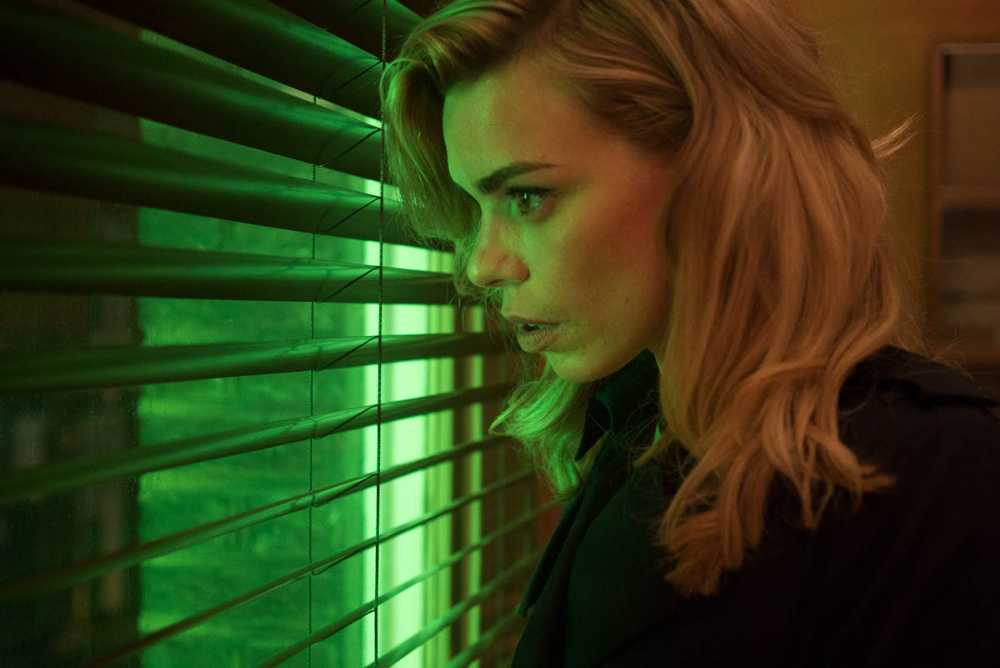 Where the film diverges from genre – and, it has to be said, sometimes strikes a slightly jarring note – is in Tommy’s back story: how a tragic episode from his teenage years infiltrates today’s events, kicked off when he unexpectedly encounters school mate Lovely (an oily James Floyd) at the centre of the film’s property scheme. Travis’s tender flashback sequences do raise the question, however, of how the sensitive, damaged teenage Tommy ended up as a streetwise gumshoe with a mean right hook.
Where the film diverges from genre – and, it has to be said, sometimes strikes a slightly jarring note – is in Tommy’s back story: how a tragic episode from his teenage years infiltrates today’s events, kicked off when he unexpectedly encounters school mate Lovely (an oily James Floyd) at the centre of the film’s property scheme. Travis’s tender flashback sequences do raise the question, however, of how the sensitive, damaged teenage Tommy ended up as a streetwise gumshoe with a mean right hook.
Riz Ahmed is wonderfully watchable, however: smouldering, simmering but vulnerable, too, and with sudden glimpses of steely determination behind his determinedly sullen exterior. Billie Piper (pictured above) seductively slurs her way through her performance as Shelley, Tommy’s former illicit girlfriend now turned high-class hostess, and Cush Jumbo as Melody Chase is fragile but fiery. Felix Wiedemann’s restrained cinematography is a joy – colour-sapped for his grimy London exteriors, but suddenly blinding with lurid hues in the film’s pounding club scenes.
The film’s miraculously happy ending might feel a touch unconvincing, and ultimately pulls back from delivering on some of the intrigue that’s been set up. But City of Tiny Lights is a captivating offering all the same – although one that’s more absorbing in its impeccably delivered atmosphere, rather than truly suspenseful.
Overleaf: watch the trailer for City of Tiny Lights

“What if I’ve made a terrible mistake?” Angie (a flirty, engaging Elizabeth Moss) is about to give birth to psychiatrist RD Laing’s baby, and you have to agree that it’s not the wisest plan. She’s confiding in one of the disturbed residents of Kingsley Hall, Laing’s experimental psychiatric community in east London where therapists and patients lived communally, anti-psychotic drugs and ECT were outlawed and LSD (and going to the pub) was part of the cure.

Ben Wheatley’s sixth film in a prolific, unpredictable career is a shoot-‘em-up in the most literal sense. Setting a superb international cast led by Brie Larson and Cillian Murphy down in a big, grim warehouse, he lets them blast bits off each other for 70 of Free Fire’s 90 minutes. After Wheatley’s most obviously ambitious film, his J.G.

